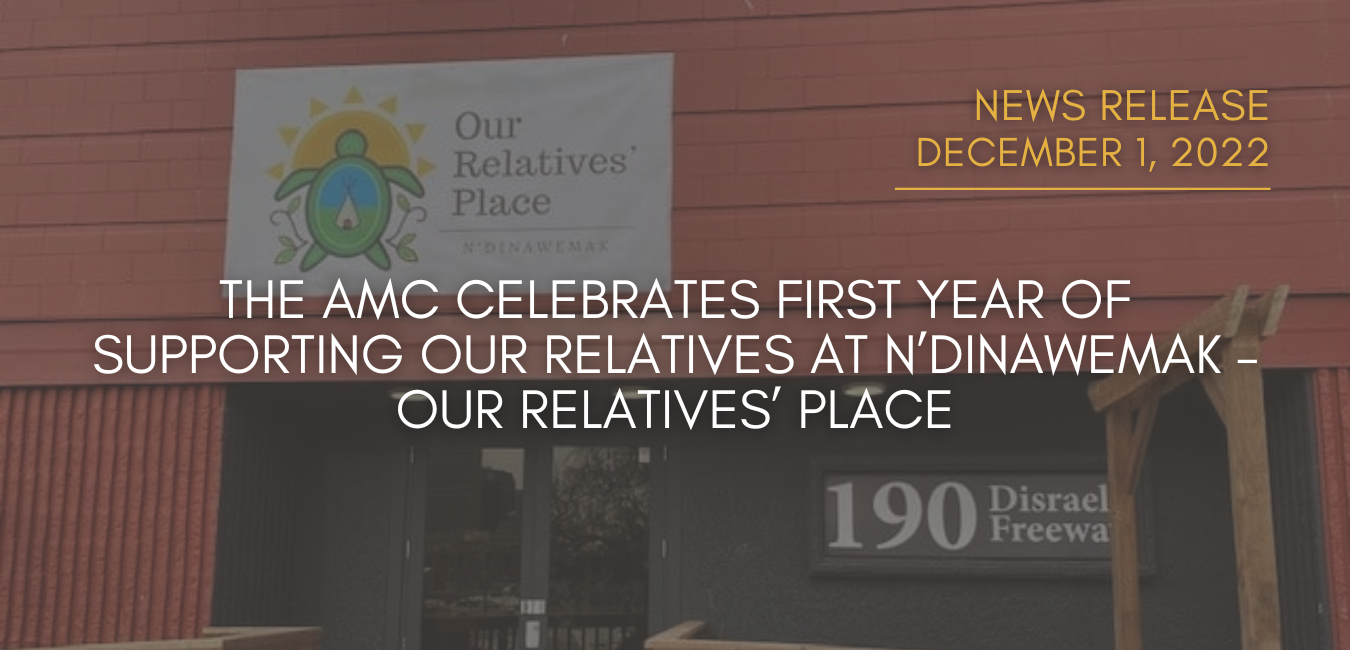The AMC Celebrates First Year of Supporting our Relatives at N’Dinawemak – Our Relatives’ Place

December 1, 2022
Treaty One Territory, Manitoba
alexpapineau
Treaty One Territory, Manitoba – The Assembly of Manitoba Chiefs (AMC) acknowledges the first anniversary since opening N’Dinawemak – Our Relatives’ Place. The first of its kind, this Indigenous-led coalition of organizations have committed to providing a warming space for Relatives experiencing homelessness in Downtown Winnipeg.
“N’Dinawemak is a crucial resource for our unsheltered relatives that are trying to survive, especially now as we see the arrival of our cold winter months,” stated Grand Chief Cathy Merrick. “In response to a lack of culturally appropriate resources here in Winnipeg for our Relatives who experience homelessness, N’Dinawemak was created to meet the needs of Relatives and to ensure they have the supports to guide them on a good path.”
N’Dinawemak was created in response to the growing unsheltered population in Winnipeg. According to the 2022 Winnipeg Street Census, 75% of respondents experiencing homelessness in Downtown Winnipeg are Indigenous, with 50.1% identifying as status First Nations. Most concerning were and continues to be the high representation of First Nations relatives currently living unsheltered with experience in the Child and Family Services (CFS) at 69.5%.
“The relatives that utilize N’Dinawemak every day provide a devastating snapshot of the way our society continues to fail our most vulnerable citizens,” stated Cora Morgan, First Nations Family Advocate. “Many of our relatives relying on N’Dinawemak are those that have been impacted by the CFS system; children aging out at 18 years old with a complete absence of system supports and/or parents whose children were taken away. In addition, we witness those who carry the trauma of the effects of Indian Residential School and the Sixties Scoop experiences. It is quite evident that the prolonged institutionalization our relatives have faced under government systems in their life continues to have abysmal outcomes”.
In May 2022, the AMC-FNFAO committed to an agreement with End Homelessness Winnipeg to take a lead role in operational oversight at N’Dinawemak to restructure its service delivery model to assist Relatives more closely in achieving their long-term housing and wellness goals. N’Dinawemak currently operates as a 24-hour drop-in warming space with 140 beds for a safe night’s sleep for Relatives experiencing homelessness. Beyond providing a safe warming space this past year, N’Dinawemak has also provided extended holistic support services to 481 Relatives by assisting with securing identification, providing tax assessment services, increasing access to culturally appropriate counselling and healing supports such as Elder support, acute medical care, mental health and addictions support referrals, and housing and CFS advocacy services. Most significantly, trained N’Dinawemak staff have saved the lives of 28 Relatives by administering naloxone and First-Aid/CPR training procedures on the scene.
“N’Dinawemak has consistently been at full bed capacity with overflow into their common areas each night to ensure that everyone is at the very least guaranteed some reprieve from the colder weather. Right now, N’Dinawemak has only received short-term funding every six months from the province. We need all levels of government, federal, provincial and municipal, to critically provide long-term committed funding,” concluded Grand Chief Merrick.
For more information, please contact:
Communications Team
Assembly of Manitoba Chiefs
Email: media@manitobachiefs.com
About the Assembly of Manitoba Chiefs
The AMC was formed in 1988 by the Chiefs in Manitoba to advocate on issues that commonly affect First Nations in Manitoba. AMC is an authorized representative of 62 of the 63 First Nations in Manitoba with a total of more than 151,000 First Nation citizens in the province, accounting for approximately 12 percent of the provincial population. AMC represents a diversity of Anishinaabe (Ojibway), Nehetho / Ininew (Cree), Anishininew (Ojibwe-Cree), Denesuline (Dene) and Dakota Oyate (Dakota) people.